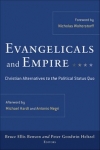 The globalization process brings specific issues: who will control the dynamics of the global capitalist economy? Two famous authors, Michael Hardt and Antonio Negri, emphasize in two well-known books, Empire and Multitude, that an imperial trend is currently working.
The globalization process brings specific issues: who will control the dynamics of the global capitalist economy? Two famous authors, Michael Hardt and Antonio Negri, emphasize in two well-known books, Empire and Multitude, that an imperial trend is currently working.
Its aim is domination, domination, and profit.
What about the religious factor? What about the role of Evangelicals in empire?
Edited by Bruce Ellis Benson and Peter Goodwin Heltzel, a new book has juste been released. Its title is Evangelicals and Empire. Christian Alternatives to the Political Status Quo (Grand Rapids, Brazos Press -Baker-, 2008).
This very stimulating volume has already been discussed in many places, including Wheaton College.
 This collection considers empire from a global perspective, exploring the role of Evangelicals in political, social and economic engagements, at a time when empire is alternately denounced and embraced.
This collection considers empire from a global perspective, exploring the role of Evangelicals in political, social and economic engagements, at a time when empire is alternately denounced and embraced.
It brings thinkers and scholars from a wide range of perspectives together to engage the most explosive and discussed theorists of empire in the first decade of the XXIth Century, Michael Hardt and Antonio Negri.
Amongst the happy contributors, you'll find... a French scholar you may know.
 My paper's title is "Empire's Future religion: The Hidden Competition between Postmillennial American Expansionism and Premillenial Evangelical Christianity" (p.120 to 129).
My paper's title is "Empire's Future religion: The Hidden Competition between Postmillennial American Expansionism and Premillenial Evangelical Christianity" (p.120 to 129).
Here is a summary of my main argument:
The purpose of this paper is to compare and confront the secular postmillennial worldviews of the neocons -and of most of G.W.Bush’s administration- with the Evangelical premillennial emphasis. Through this particular lense, the notion of Empire is translated in very different ways.
“We are going to change the world”. President G.W. Bush has repeated several times this mantra. At first sight, such a messianic view seems to fit quite well with the Evangelical missionary rhetoric. Both seem to engage in the Armageddon-like struggle between good and evil. There is no wonder if conservative denominations like the Southern Baptist Convention have been extremely supportive to the recent US global “war on terror”. There is ample common ground between the Freedom crusade emphasized by G.W. Bush and the Evangelical missionary zeal.
For both ideological camps, Europe is also an anti-model. Michael Hardt and Antonio Negri demonstrate the emerging Empire is fundamentally different from the imperialism of European dominance. “Old Europe” is a repulsive paradigm for the neo-cons, as well as it is a repulsive model (as too secular) for many US Evangelicals.
These convergences are addressed in the first part of this paper (I). However, a closer look at the roots of both rhetorics leads to question the interpretation of an objective ideological alliance between the neocon’s idea of US Empire and the Evangelical emphasis on mission.
On the one hand, US Empire seems to be defined as a coming paradise: as we will see in the second part of this paper (II), many aspects of the worldview emphasized by G.W. Bush’s administration seem to fit quite well with a postmillennial messianism where global salvation is more or less correlated with the earthly success of the American nation. According to this view, it seems that “there is no limit to America’s greatness” (dixit G.W.Bush on his re-election day, November the 3rd, 2004).
On the other hand (see the third part of the paper), Evangelical view of a coming Empire seems mainly shaped by a very different ideological frame (III). Relying on a premillennial interpretation of the words attributed to Jesus-Christ (“My kingdom is not of this world”), Evangelicals hold a far more pessimistic view of the political, economic and cultural future of the global world (see the Left Behind series). For them, only God’s power has no limits. History itself, as it is ruled by sinful humans, cannot provide a global Paradise.
You want to know more? Read the book! Thanks to Amazon, it is available in and out of the Empire!!![]()